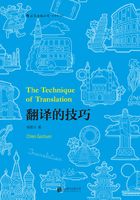
(7)第四句型的授与构造
主语 + 述语 + 间接宾语 + 直接宾语
这是在一句当中用两个宾语的造句法。普通的他动词只要有一个宾语就行了,但这种他动词却需要两个宾语,即除了直接的宾语外,还需要有一个间接的宾语。那个间接宾语,在拉丁文中称为与格(Dative Case),Dative意为英文的giving.因此对于要有间接宾语的这一类的动词,就称为授与动词(Dative Verb)。英文与拉丁文不同,间接宾语与直接宾语并没有各自不同的形态,所以间接宾语并无所谓授与格的名称,不过形态虽同,在意味上却是有这种授与格的存在的,因此在英文中也仍然保留着Dative这个名称。
间接宾语通常是人,而直接宾语则通常是说的事物,如That will save me a lot of trouble.(那将省我不少的麻烦。)但偶然也有间接宾语不是说人的,如He allowed his imagination full play.(他任意胡思乱想。)
通常是把间接宾语放在直接宾语的前面的,但有时为着加强语气,或使意义更为明白起见,也可以把间接宾语移到直接宾语的后面去,不过在那时候,就得在间接宾语前加上“to”,“for”,“of”等介词,而把它做成介词片语,使之完全失去宾语的性质了,例如:
He gave me a book. = He gave a book to me.
He will buy me a knife. = He will buy a knife for me.
I wish to ask you a favour. = I wish to ask a favour of you.
He played our master a dirty trick. = He played a dirty trick on our master.
但两个宾语如果都是简短的代名词时,间接宾语即令移到直接宾语的后面去,也不要加用介词,如:
Her mother did not give it her.(她母亲并未把那个给她。)
We rather shrank back when she proffered it us.(Caskell,Cranford)(当她提出那个来的时候,我们都退缩了。)
间接宾语移到了直接宾语的后面仍不加介词,是因为省略掉了,而且只有在简短的代名词如it,me,her,him等时才可省略,不省当然是可以的,如说Please give it to her.(美国说法)。省略后便成为Please give it her.(英国说法)。凡遇到间接与直接二者全是短字,也可以说成Please give her it. 但如直接宾语不是代名词而是名词时,要前后调动就非加介词不可,那时我们必须说:
Please give the book to her.
若照平常的次序说Please give her the book. 当然是可以的。应该注意的是,我们不可以说Please give the book her. 因为直接宾语不是代名词,故“to”不能略去。间接宾语为名词,而不是代名词时,也不能把“to”略去,如
I gave it to the beggar.
不能说I gave the beggar it. 但可以说I gave the beggar a coin. 或是I gave a coin to the beggar.
如果间接与直接两种宾语的音价(phonetic value)相等,或直接的更轻,那么,还是要维持原来的次序的,如
I grudge him you.(Shaw)(我不肯把你交给他。)
Do not send me those.(Onions)(不要把那些东西送给我。)
Bring me him down like a ripe apple.(Stevenson)(把他当作一个熟透了的苹果一般,小心地带到我这儿来。)
Tell him this.(Onions)(把这件事告诉他。)
间接宾语多半是人,而且是受惠者:(a)他是获得什么东西,看到什么东西,或听到什么东西的人(the person to whom something is given,shown or told);或是(b)别人为他做了什么的人(the person for whom something is done)。这便是间接宾语为数最多的两大类。间接宾语如果不是受惠者,如
He asked me a few questions.(他问了我几个问题。)
I can forgive him anything and everything.(一切我都可以赦免他。)
等句中的间接宾语,是不能得到任何利益的。这时节我们就不妨把两个宾语都看作直接宾语。
授与动词可以细分为四类,即授与(give)东西,告知(tell)事情,贡献(render)服务,及施行(perform)恩惠(有关得失的)。前三类中的间接宾语都可以加“to”改成介词片语,即to-phrase,for-phrase(有的文法家将此视为一个间接宾语)等,如:
Give me the book. = Give the book to me.
Tell us a story. = Tell a story to us.
Do me a favour. = Do a favour to me.
唯有最后一类不能用“to”,要用表示目的的介词“for”来把间接宾语改写为介词片语,如
Get me a glass of water. = Get a glass of water for me.
这种用法的动词在现代英语中为数极少,如果在古代的话,则几乎任何动词上都可以加一个恩惠的授与格(Dative of Favour),如Open me the door.今则说Open the door for me.他如Shakespeare说的:Heat me these irons hot.(趁热为我打铁)等等都是的。
只有授与动词如give,bring,teach,show,ask,send,make,lend,owe,tell,sell,cost,read,write,offer,pass,pay,promise,choose,find,leave,get,play,reach,sing等,才能接用两个宾语,其他的他动词则只能接用一个宾语。今就同义的动词举例比较如下:
(a)We gave him a watch.( = gave a watch to him)
(b)We presented him with a watch.(presented a watch to him)
(a)A litle was given him.
(b)A litle was conferred on him.
(a)He teaches us English.
(b)He instructs us in English.
(a)He asked me a question.
(b)He put a question to me.
1. 有授与意味的授与动词——兹就其惯用句法例示如下:
我在一个月前通知他解职。
I have given him a month’s warning(notice).
我当面责备他是撒谎。
I gave him the lie in his throat.
公平地说,敌人是勇敢的。
To give the devil his due,the enemy are quite brave.
接到来函使我大为高兴。
Your letter has afforded me much pleasure.
他每月给他儿子五百元。
He allows his son five hundred dollars a month.
我在他头上给以重重的一击。
I struck him a hard blow on the head.
我将尽量给你帮助。
I’ll lend you all the assistance in my power.
他传言说要来。
He has sent us word that he is coming.
如果有什么信件寄来请转给我。
Please forward me any letter that may come.
他答应给我职务。
He has promised me an appointment.
我去烹点茶来给你喝。
I will make you some tea.( = I will make some tea for you.)
她自制了一袭新衣。
She made herself a new dress.( = She made a new dress for herself.)
她为他做一个好妻子。
She made him a good wife.(Cf. 她会成为一个好妻子的。译成She will make a good wife. 句中的make = become. 此句为第二句型,即“主语+ 述语+ 补语”。)
2. 有告知意味的授与动词:
王先生教我们的英文。
Mr. Wang teaches us English.
请你告诉我去车站的路好吗?
Will you please show me the way to the station?
孩子们要我讲故事给他们听。
The children want me to tell them a story.
你唱支歌给我听吧,在我离去之前。
Sing me a song before I leave.
让我把他刚来的信念给你听。
Let me read you his letter just received.
3. 有贡献意味的授与动词:运动是对你有益的。
Exercise will do you good.
喝少量的酒是无害的。
A little wine will do you no harm.
公平地说一句,他并不是坏人。
To do him justice,he is not a bad man.
请你帮我一个忙好吗?
Will you do me a favour?
在我贫困时,他给了我不少的帮助。
He has rendered me great help in time of need.
4. 有得失意味的授与动词:
我去替你买张戏票来。
I will get you a ticket.
你有了这张票即可入场。
This ticket will gain you admission.
我要尽量使你获得好的条件。
I will try to procure you the best terms I can.
那本书使他出了名。
The book won him a reputation.
他太迟钝了,以致失掉了那个机会。
His slowness lost him the chance.
5. 还有一种变则的授与动词,是只有间接宾语而无直接宾语的,与文法原则相反,故称变则。
这件衣服你穿了很合适。
The dress becomes you very well.
年轻人宜彬彬有礼。
Modesty becomes a young man.
我已有准备来应付可能到来的最坏的情形。
I am prepared for the worst that can befall me.
这幢房子花了我三万元。
This house cost me thirty thousand dollars.
你多久才把英文学好的?
How loog did it take you to master English?
这件衣我穿了五年。
This coat has lasted me five years.
我的英文知识给了我很大的用场。
My knowledge of English stood me in good stead.
在第四句型的构造中有下列三种形式:
1. S. + Vt. + Noun(Pronoun) + Noun:
I gave John(him)the book.
I bought John(him)the book.
I asked John(him)the question.
2. S. + Vt. + Noun(pronoun) + how(when,where,what,which) + to-Infinitive:
I taught John(him)how to drive a car.
Did he tell you when to start?
Please show me where to find them.
He told me what to do next.
He showed me which(which way)to choose.
3. S. + Vt. + Noun(pronoun) + that(what,which,who,how,when,where,why,if,whether)Clause:
He told me that he did not know it.
He asked me what was the right way to do it.
Will you tell me which(which book)you have read?
He does not tell me who is going with us.
He does not tell us whom he is going to bring.
He asked me how(where,when,why)I was going to do it.
Will you ask him if(whether)he is coming with us?
习题4
试将下列各句译成英文,句中须采用授与动词。
1. 只有人类有天赋的说话才能。
2. 他让了座位给她。
3. 他父亲留给他一大笔遗产。
4. 我把那钱付给他了。
5. 我来把信念给你听。
6. 你给我唱一支中国歌好吗?
7. 我很羡慕你运气好。
8. 我很恭维了他。
9. 敬祝成功愉快。
10. 我很抱歉给你许多麻烦。
11. 他们甚至连极微薄的报酬都不给我。
12. 我希望你不至拒绝我的请求。
13. 旅客只许带三十磅的行李。
14. 中国古话说,女子无才便是德。
15. 他们对自己的国家没有一点责任感。
16. 她要不是为着对她孩子的爱她就愿意死去。
17. 我并不羡慕阔人的财富,那使他们非常忧烦。
18. 公平地说一句,他一直是一个好丈夫,也是一个好父亲。
19. 那个恶棍长久逃避追捕终于落网。
20. 微物请赐哂纳为幸。